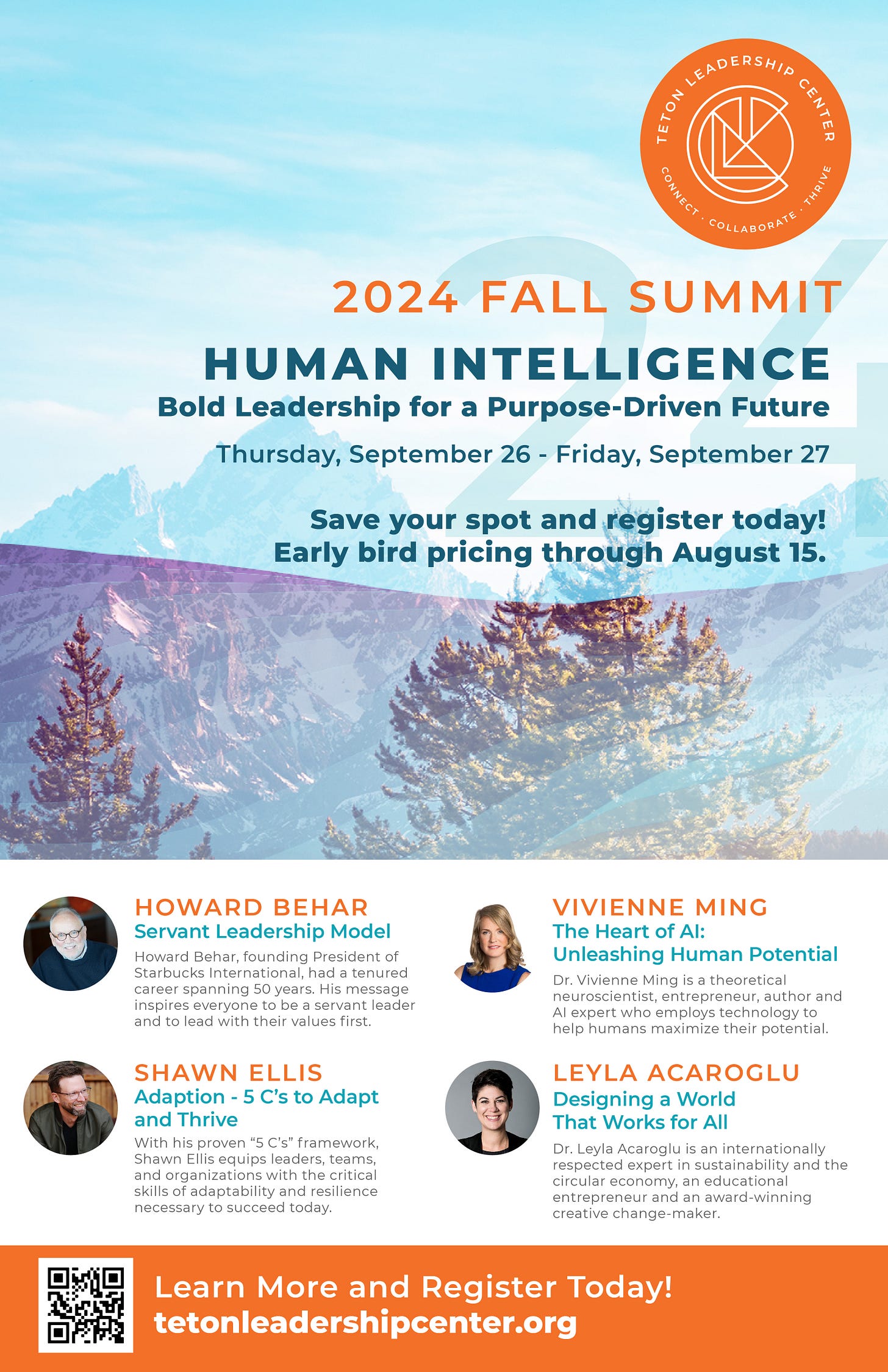The Art of Reframing Capitalism
A conversation about the unparalleled potential for the private sector, driven by the innovative spirit of capitalism, to address the complex challenges of our times.
Where there is an open mind, there will always be a frontier. ~ Charles F. Kettering, an inventor and engineer
Last Tuesday night, I was honored to be the moderator of a “Teton Talk” at the Teton County Library. The event was billed as a community conversation with innovative thinkers Rob Kellogg, the new ED of Silicon Couloir, and Fred Keller, founder of Cascade Engineering, about the unparalleled potential for the private sector, driven by the innovative spirit of capitalism, to address the complex challenges of our era. We came together united in a belief that, in the words of Fred Keller,“To ignore the capability business has to solve difficult, complex problems is to waste the single greatest opportunity the world has to solve its toughest problems.”
My pregame jitters were quickly assuaged as the room filled with community members of all ages and walks of life looking to discover actionable strategies to implement in their own business or investment practices that will positively impact our environment and communities.
Fred Keller set the stage with a brief history of capitalism and economic theory, with an emphasis on the 1970s when Milton Friedman famously declared the single social purpose of a business is to make a profit for shareholders, and it was up to the government and civic society to solve social and environmental issues.
Calling himself a child of the ’60s, Keller outlined how he started his career “with this intuition, this thought, that whoever was in charge was really screwing up, so we’ve got to figure out how to do it better.” Examples from his company, Cascade Engineering, include their Welfare to Career program that reduced turnover from 50-60% to 3% by treating individuals well, including having social workers in their plants, and on the environmental side, working to become a zero waste company by recycling and reusing everything possible.
An adept student of history, Fred reflected that he had just turned 80 years old and challenged us to look back two lifetimes to 1864 while he walked us through major shifts in capitalism from the dark days post-Civil War when industrialization began to drive change through the depression, World Wars, the incredible growth of industry and into the “Golden Age” of capitalism from 1945- about 1973, a “time when people who were in business cared about the environment, cared about the communities, and they really were making a difference with their businesses.” He added thoughts on the history of regulation of monopolies, income inequality, and the impact of Friedman’s thinking on modern capitalism.
“It’s okay to say that capitalism isn't doing what we expected; this is different from saying the alternative to capitalism is communism or socialism. The challenge is, can we practice capitalism differently so that everyone benefits in society as a whole as well as our environment?”
Rob Kellogg, a leading advocate and practitioner of Impact Investing, set the stage for discussing the role of conscious investment in fostering sustainable and equitable growth by outlining the six different degrees of “impact investing.” through the lens of “who's it done by and who's it done for,” citing examples from micro-finance of regenerative agriculture in Rwanda or Kenya to EGI Investing and how publicly traded companies are screened for environmental and social impact.
The audience posed questions that brought the conversation around to positive and negative externalities and how they motivate (or often don’t because they are unseen) consumer and corporate behavior. One of my favorite moments was when Kellogg was discussing “concessionary” capital and “conceding” to take a low market rate of return, Keller suggested that the use of negative words like these is an excellent place to start a paradigm shift, suggesting rethinking the words we use could make a difference in the paradigm shift we need to practice capitalism better.
“We don't have language yet that says we want to have a positive impact on the world, nor do we know how you measure that so that it isn't just always a matter of looking at your return on your dollar investment. How do we understand that our role in life isn't necessarily to make the most money, but to make the most impact?” ~ Fred Keller
The discussion turned to Artificial General Intelligence (AGI), the term for artificial intelligence that matches or surpasses human capabilities across a wide range of cognitive tasks in contrast to narrow AI, which is becoming widely available now designed for specific tasks. The “democratization of knowledge” was discussed at length, which Keller believes has us on “the verge of a tremendous disruption in capitalism."
Kellog predicted that as many jobs become obsolete, the USA will have to institute some version of Universal Basic Income to compensate for lost human productivity paid for by AGI corporations. Despite the rapid rate of change, Keller cautioned us against knee-jerk reactions to AI issues, suggesting, “We have got to be able to live with uncertainty, to stay in it. When we start looking for immediate solutions, we often go the wrong way. We've got to be able to live with this uncertainty and stay in it.”
The role of education, specifically the opportunity for community colleges (as an alternative to “elite” universities) to rethink capitalism and do business better, was also discussed at length. We also pondered the Inflation Reduction Act (considered the most significant climate bill in U.S. history) and Wyomingites' reluctance to participate in government-funded programs with the potential for social, environmental, and financial upside because of political ideologies.
We also discussed the critical “dynamics of shareholders” (the idea that young people today are willing to just walk away from a job if they feel the company does not uphold social or environmental ethics in doing business). With the rise of AI, distrust of capitalism, uncertainty, and change, how do we keep the younger generations motivated?
Too many politicians focus only on policies supporting their party and political ideology, not the country's or the world's greater good. Change has to come from the bottom up; this is where bold leadership comes in. Top-down policies are not going to solve our problems. We didn’t solve any problems either Tuesday night. Still, we engaged in the first (and probably most important) aspect of bottom-up change - conversation, envisioning a better future, and deep consideration of diverse perspectives.
Whether you are a leader in your school, family, community, or business, how do you lead so that your people flourish? Creating spaces where conversation, fresh ideas, and collaboration thrive is an excellent place to start. The world depends on our thoughts as individuals now–examining and correcting our attitudes and actions and becoming the kind of person we would follow wholeheartedly. Good leadership faces chaos, change, and uncertainty with grace and grit while creating the conditions for ideas to reach their full potential.
“I think our biggest opportunity is to learn how to be inquisitive as opposed to judgmental. We should think of differences horizontally instead of vertically and open our minds to help create a new narrative. We can do this kind of difficult work, but it's going to take us all working together.” ~ Fred Keller
Join me in September in the Tetons - Use discount code SUBSTACK for $50 off registration.
Recommended Reading-
Milton Friedman - 1970 article in the NYT
The Coming Wave: Technology, Power, and the Twenty-first Century's Greatest Dilemma Mustafa Suleyman Michael Bhaskar
Donut Economics: 7 Ways to Think Like a 21st Century Economist - Kate Raworth
An Unfinished Love Story: A Personal History of the 1960s Doris Kearns Goodwin
A Theory of the Firm: Governance, Residual Claims, and Organizational Forms by Michael C. Jensen








